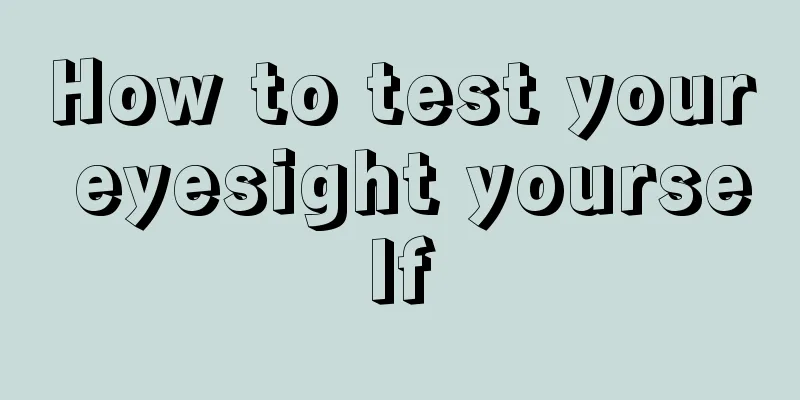How to test your eyesight yourself

|
The method of self-testing vision is relatively simple. We can test the range of our vision ourselves in an eye clinic. As long as we stand in the right position, we can check the range of our vision according to the direction specified by the doctor. If we want to test our eyesight ourselves, we can also use the light response method and eye covering method. There are many ways to check. You can try the following methods based on your own physical examination. How to test your baby's vision In daily life, you can use the following methods to detect your baby's vision: TIP1: Light response method Two months after birth, the baby's sensitivity to light becomes more acute. When light suddenly shines into the baby's eyes, he or she will unconsciously squint and frown. If parents find that their baby has no reaction to light, it means that the baby has vision impairment and they should see an ophthalmologist in time. TIP2: Eye Covering Parents can cover the baby's eyes alternately and observe the baby's reaction. If the baby doesn't care when you cover one eye, but pushes the covering away with his hand because he can't see clearly when you cover the other eye, it means that the eye that was covered first has vision impairment. TIP3: Watch and follow movement method Two months after birth, babies have the ability to look at and follow moving objects, and this ability becomes stronger as the months go by. So if parents find that their baby cannot keep a steady gaze on the target, or appears to be looking aimlessly, it means that there is something wrong with his vision! TIP4: Eye chart test method This is the most common method of testing vision. Babies under 5 years old may not be able to use this method due to limitations in their cognitive abilities, but if the baby is over 5 years old, parents can guide him or her to use the vision test chart through parent-child games. Tips: The normal vision range for children of different age groups in my country is: 2 years old: 0.4-0.5; 3 years old: 0.5-0.6; 4 years old: 0.7-0.8; 5 years old: 0.8-1.0; 6 years old: 1.0 or above. How to read baby's eye chart Keeping an eye chart at home can quickly and accurately measure your baby's vision. The eye chart mainly checks central vision, that is, checks the concave visual acuity in the center of the baby's retinal macular area. Parents can choose a children's eye chart according to their baby's preferences. Currently, common eye charts on the market include children's graphic eye chart, E-label eye chart, etc. Parents should try to get their baby to cooperate with the eye chart, such as asking the baby to imitate the animal figures in the chart, to check whether his or her vision is normal. Since a baby's vision will not become completely stable until around the age of 12, parents should always pay attention to changes in their baby's vision. If you find that your baby has abnormal vision, you should consult a doctor immediately. |
>>: Methods for adjusting vision
Recommend
Is it better for newborns to use diapers or wet diapers in summer
Diapers and wet wipes are both products designed ...
How to provide nursing care after lung cancer surgery? Effective nursing methods after lung cancer surgery
The effective nursing methods for lung cancer aft...
How to check if it is brain cancer
How to check if it is brain cancer? Brain cancer ...
What's wrong with the fever in the knee joint
The knee is one of the most frequently moving joi...
Can white spots on the face be contagious to other people?
The appearance of white spots on the face may be ...
How to quickly stop itching caused by allergies on face
In life, skin allergies often occur. Skin allergi...
What are the symptoms of sinus arrhythmia
Many people may not be familiar with sinus arrhyt...
How should a swollen and painful throat be treated?
Throat swelling is a common symptom, and not only...
What are the effects and functions of isopamicin sulfate injection
In life, we often suffer from some trauma or burn...
Which diseases are easily confused with esophageal cancer
Clinically, there are several diseases that are e...
How long does it take for the surgical incision to fully recover
As we all know, after surgery, patients will gene...
Will I definitely get cervical cancer if I get infected with HPV? What are the ways to prevent cervical cancer?
It is currently believed that most cervical cance...
Can stomach cancer be detected through physical examination?
Can stomach cancer be detected through physical e...
How to clean teeth without a toothbrush
Teeth are a very important part of the human body...
What are the methods to prevent teratoma
The location of teratoma varies, and there are ma...









